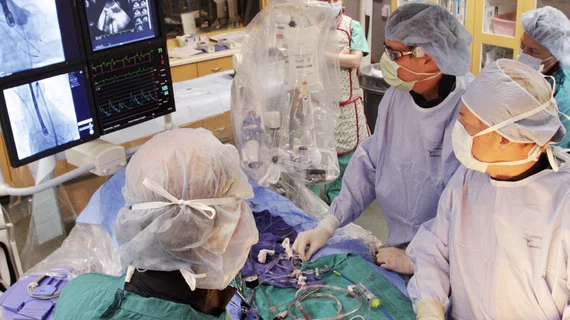TVT 2023: Cardiovascular Research Foundation announces late-breaking clinical trials
The Cardiovascular Research Foundation (CRF) has announced the full slate of late-breaking clinical studies scheduled for TVT 2023 in Phoenix. The four-day conference is scheduled to take place June 7-10, 2023.
TVT, now in its 16th year, gathers interventional cardiologists and other specialist from all over the world to focus on the latest research, clinical practices and technologies associated with the treatment of structural heart disease. In addition to these 15 late-breaking clinical studies, TVT 2023 will also include more than 30 live cases, hands-on training, poster presentations, networking opportunities and more.
Read the full list of late-breaking clinical studies below so you can begin organizing your schedule:
Thursday, June 8
Late-Breaking Clinical Science I: Mitral Valve Disease
Innovation & Clinical Science, Room 106
11 a.m. – 12:15 p.m. MST
- Contemporary, Core-Lab Assessed, Acute Clinical Outcomes from 2,000+ Patients with Mitral Regurgitation Treated With the 3rd and 4th Generation MitraClip Systems: Results from the EXPANDed Post Approval Studies
- Longer-Term Clinical and Echocardiography Follow-up of Transcatheter Mitral Valve Replacement With the Trans-apical Intrepid System
- Contemporary Outcomes of Transcatheter Transeptal Mitral Valve in Valve in the United States
- Mitral Valve Repair versus Replacement after Transcatheter Edge-to-Edge Mitral Repair: Results From The CUTTING-EDGE Registry
- Pressure Gradients and Mortality Following Transcatheter Mitral Valve-in-Valve and Valve-in-Ring
Friday, June 9
Late-Breaking Clinical Science II: Aortic Valve Disease/Transcatheter aortic valve replacement (TAVR)
Innovation and Clinical Science, Room 106
11 a.m. – 12:15 p.m. MST
- 5 Year Outcomes of TAVI Patients With Prosthesis-Patient Mismatch
- Transcatheter Aortic Valve Replacement Using a Balloon-Expandable Valve in Patients With Type-0 Bicuspid Aortic Valve Stenosis
- Real-World Early Outcomes of Evolut FX Versus PRO+ Transcatheter Aortic Valve Replacement
- Analysis of New Permanent Pacemaker Implantation in the PORTICO NG Study Utilizing the Intra-Annular, Self-Expandable Navitor Transcatheter Aortic Heart Valve
- Three-Year Outcomes From the Evolut Low Risk TAVR Bicuspid Study
Saturday, June 10
Late-Breaking Clinical Science III: Early Human Experiences – Mitral Valve Replacement Innovation
Innovation and Clinical Science, Room 106
11 a.m. – 12:15 p.m. MST
- Innovalve First-in-Human TMVR Experience (TWIST FIH): Clinical Outcomes and Echocardiography Evidence for Reverse Remodeling
- Early Human Experience With the Cephea Transseptal TMVR System in Complex Mitral Anatomies
- Bioprosthetic Surgical Valves in Intermediate-risk Patients: 1-Year Outcomes of the PARTNER 3 Mitral Valve-in-Valve Study
- AltaValve Early Feasibility Study: Preservation of Mitral Valve Physiology Using a Passive Fixation TMVR Device
- Trans-septal Mitral Valve Replacement With HighLife Valve in a Patient with Moderate-Severe Mitral Regurgitation
More information from CRF about TVT 2023 is available here.

